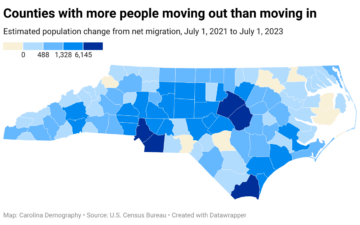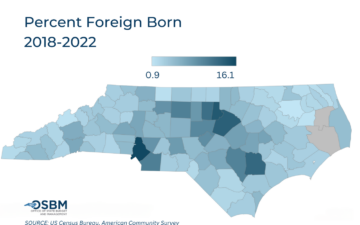What we deliver
We help people understand the population changes facing their communities
We help you understand what data you need, and where and how to access that data.
We use rigorous methods to translate the data and provide meaningful context.
We strengthen the capacity of your organization to communicate data-driven ideas.
Using datasets and primary research, we provide accessible and customizable insights in whatever format makes the most sense for your team. Learn more about our work and explore stories of how our clients use our tools and expertise to inform their decisions.

A large utility company was planning to expand their operations and add hundreds of new field employees within a year. However, existing field employees were simultaneously leaving the company at a high rate. This added significant costs and hindered the organization’s capacity to scale operations. The utility company needed to understand why their current employees were leaving and how their turnover rates compared more broadly to industry trends. Through analysis of the utility company’s employee databases and conversations with their executives, Carolina Demography developed a profile of employees most likely to stay (and, conversely, those…

Since 2011, the Center for Galapagos Studies (CGS) has marshalled the University of North Carolina at Chapel Hill's research strengths to address the complex human and environmental pressures in the Galapagos archipelago, a UNESCO World Heritage Site and birthplace of evolutionary science. The archipelago’s growing local population and burgeoning tourism trade have created ongoing tensions between resource conservation efforts and economic development. In 2007, the Galapagos Islands were labeled “at risk” by the United Nations from threats associated with population growth. UNC and their partners at the Universidad San Francisco de Quito (USFQ) work on…

In 2014, the Wake County Board of Commissioners asked Carolina Demography to estimate when their population would surpass one million residents. In addition, they asked us to contextualize the estimated characteristics of their millionth resident in a broader discussion of past trends, current demographic characteristics, and a look to the future of Wake County. In 1910, Wake County’s population was 63,229. Although Wake County has grown steadily since then, it did not reach 100,000 residents until 1940. Over half a century later, in 1994, Wake’s population surpassed half a million. The establishment of Research Triangle…

Last week, the U.S (United States). Census Bureau released 2023 county population estimates. These annual estimates tell us how county populations in North Carolina have changed over the course of a year: in this case, between July 1, 2022 and…

Deciding which educational pathway to pursue is often a daunting decision for a high schooler transitioning to postsecondary education. There are many questions a student must ask. Do I want to pursue a credential or a degree awarding program? What…

Dr. Michael Cline is the state demographer for North Carolina at the Office of State Budget and Management and has given us permission to re-post his content here. The original version of this piece is here. The foreign-born population in…
Your support is critical to our mission of measuring, understanding, and predicting population change and its impact. Donate to Carolina Demography today.